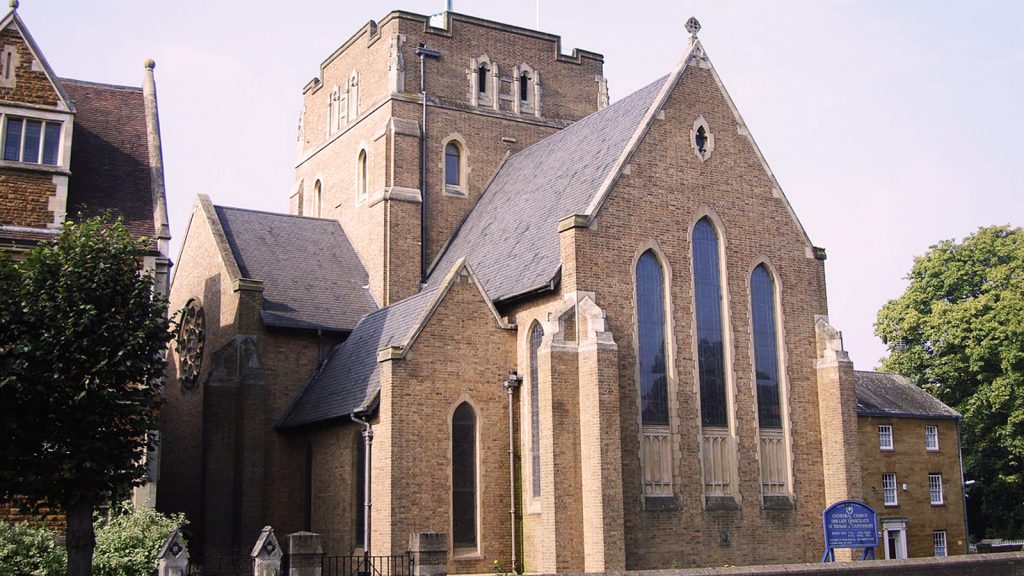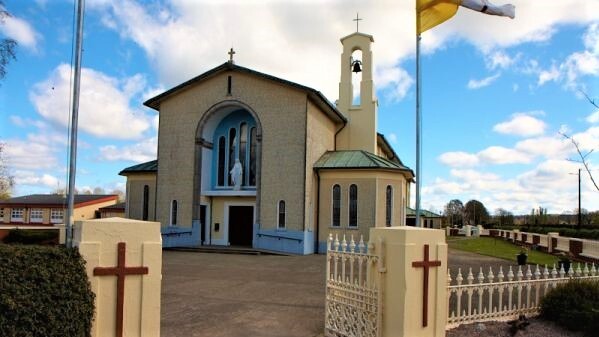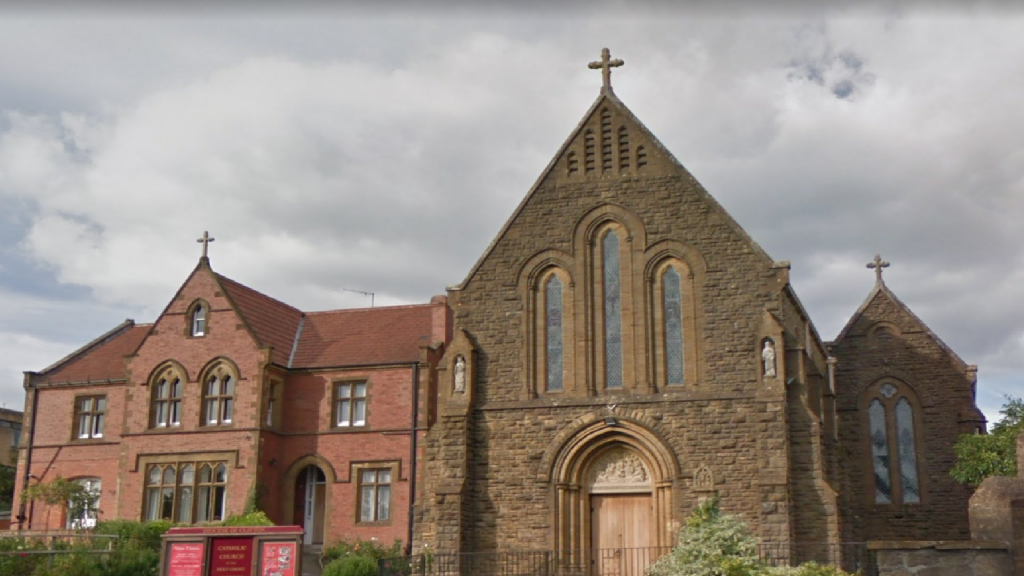Churches of the Day
Pictorial Thought for Today
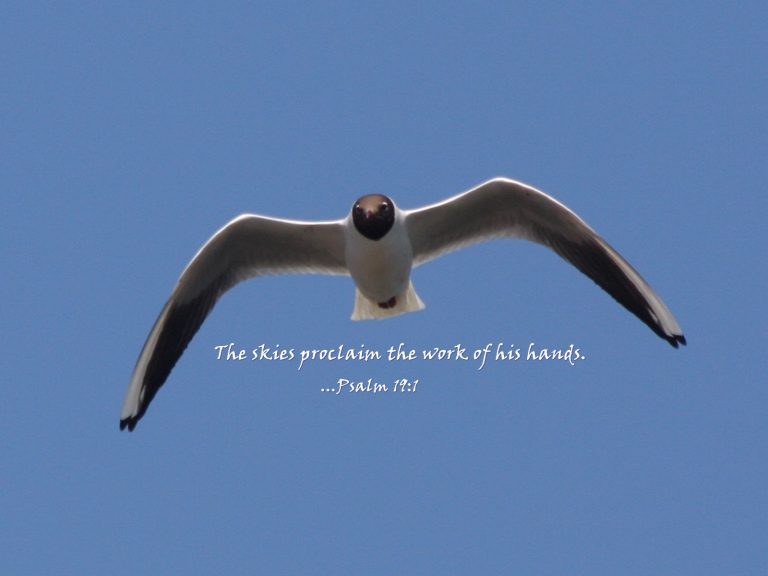
Apr 23 - St George (d. 303)
Patrick Duffy recalls some of the traditions about him.
Veneration is Ancient and Widespread
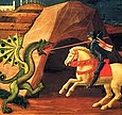 The veneration of St George is both ancient and widespread. In the East he was honoured as megalomartyros ("great martyr") and in the West his feast day is mentioned in the Martyrology of Jerome (5th-6th century), the Gregorian Sacramentary (8th century) the Martyrologies of Bede in England and of Oengus in Ireland (9th century).
The veneration of St George is both ancient and widespread. In the East he was honoured as megalomartyros ("great martyr") and in the West his feast day is mentioned in the Martyrology of Jerome (5th-6th century), the Gregorian Sacramentary (8th century) the Martyrologies of Bede in England and of Oengus in Ireland (9th century).Earliest Acta gives a Confused Narrative
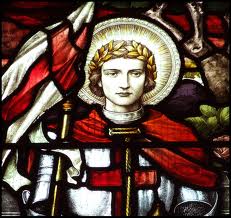 Belgian Jesuit and Bollandist scholar Hippolyte Delehaye (1859–1941) maintained that the earliest text preserving fragments of the narrative of St George was a 5th century palimpsest. But, he pointed out, the compiler of this Acta "confused the martyr with his namesake, the celebrated George of Cappadocia, the Arian intruder into the see of Alexandria and enemy of St. Athanasius".
Belgian Jesuit and Bollandist scholar Hippolyte Delehaye (1859–1941) maintained that the earliest text preserving fragments of the narrative of St George was a 5th century palimpsest. But, he pointed out, the compiler of this Acta "confused the martyr with his namesake, the celebrated George of Cappadocia, the Arian intruder into the see of Alexandria and enemy of St. Athanasius".George's life and martyrdom
George is associated with the town of Lydda (present-day Lod) ten miles southeast of Tel-Aviv. His tomb can be found today in a chapel in that town, near Ben Gurion International Airport.
The story is that he was a soldier in the Roman army. He is said to have at first obtained the favour of the emperor Diocletian and was promoted to the rank of tribune, but when the emperor began to persecute the Christians, George rebuked him, gave up his commission, was then tortured and finally beheaded. His cheerful defiance and fortitude has been an inspiration to Christians ever since. Devotion to him is one of the most ancient and widespread in the Church, both East and West.
 George the Dragon-Slayer
George the Dragon-SlayerGeorge soon became a type or symbol of successful combat against evil, so one can easily see how legends, such as the slaying of the dragon, would grow up around his name and memory.
The story is that a dragon was terrorising the locality, poisoning with its breath all who approached it. Every day it was appeased with an offering of two sheep, but when these grew scarce, a human victim, chosen by lot was to be substituted. The lot had fallen on the king's daughter who went to her fate dressed as a bride.
But George attacked the dragon, pierced it with his lance and led it away completely tamed and tied with the princess's girdle. George told the people not to be afraid: if they would believe in Jesus Christ and be baptised, he would rid them of the monster. The king and people agreed. George killed the dragon and 15,000 were baptised.
This parallels with the classical myth of the rescue of Andromeda by Perseus, which is also associated with Lydda near Tel-Aviv are significant. The story became popular in the West through the Legenda Aurea ("Golden Legend"), a 13th century collection of Lives of greater saints written by Blessed Jacobus de Voragine (1230-99) and greatly contributed to the popularity of the saint's cult.
St George in Palestine
Palestinian Christians and even Muslims celebrate George as their patron saint, especially around Bethlehem, where he is believed to have lived in his childhood. A stone-engraved image of the saint (known as Mar Jirjes) in front of houses identifies them as Christian and the occupants seek his protection. In one hotel in Bethlehem, Saint George appears over the lift, as well as many other places throughout the building. In the town of Beit Jala, just west of Bethlehem there is a statue of Saint George carved of stone in the town's main square showng the saint on his horse fighting the dragon. Not far away there is also a 16th century ancient monastery of St George.
His Popularity in Europe
George's popularity spread to Europe as a result of the Crusades. The Synod of Oxford 1222 declared St. George's Day a feast day in the kingdom of England. His apparition to the Franks at the siege of Antioch 1098 is said to have greatly encouraged them, and he made a similar appearance the following year at Jerusalem. Military orders of St George were established in Aragon (1201), Genoa, Hungary, and by the Holy Roman Emperor, Frederick III. Portugal, Lebanon, Bulgaria, Belgium, Georgia and Russia are other countries which have devotion to St George and where he appears in images, icons and statuary.
Protector of England
King Edward III of England (1327-77) founded his knighthood of chivalry, known as the Order of the Garter, under the banner of St. George. Many churches were dedicated to him in England and though his popularity may have lessened with the severe curtailment of saints days in the calendar during the Reformation, St George's Day continued to be observed.
His veneration as protector of England was approved by Pope Benedict XIV (Prospero Lambertini 1740-58).
Tuesday, Fourth Week of Easter
Optional Memorials of Ss George, martyr and Adalbert, bishop and martyr
The Good News is preached for the first time to the pagans at Antioch
and the disciples are first called 'Christians' and receive the promise of 'Eternal Life'.
FIRST READING
A reading from the Acts of the Apostles 11:19-26
They started preaching to the Greeks proclaiming the Lord Jesus.
Those who had escaped during the persecution that happened because of Stephen travelled as far as Phoenicia and Cyprus and Antioch, but they usually proclaimed the message only to Jews. Some of them, however, who came from Cyprus and Cyrene, went to Antioch where they started preaching to the Greeks, proclaiming the Good News of the Lord Jesus to them as well. Lord helped them, and a great number believed and were converted to the Lord.
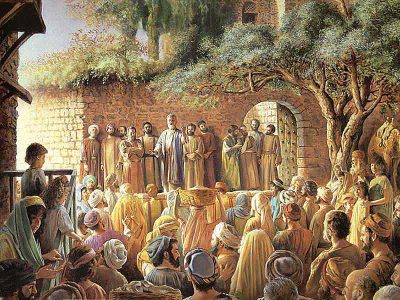
The church in Jerusalem heard about this and they sent Barnabas to Antioch. There he could see for himself that God had given grace, and this pleased him, and he urged them all to remain faithful to the Lord with heartfelt devotion; for he was a good man, filled with the Holy Spirit and with faith. And a large number of people were won over to the Lord.
Barnabas then left for Tarsus to look for Saul, and when he found him he brought him to Antioch. As things turned out they were to live together in that church a whole year, instructing a large number of people. It was at Antioch that the disciples were first called 'Christians'.
The Word of the Lord. Thanks be to God
Responsorial Psalm Ps 86
Response O praise the Lord, all you nations!
Or Alleluia!
1. On the holy mountain is his city cherished by the Lord.
The Lord prefers the gates of Zion to all Jacob's dwellings.
Of you are told glorious things, O city of God! Response
2. 'Babylon and Egypt I will count among those who know me;
Philistia, Tyre, Ethiopia, these will be her children
and Zion shall be called "Mother" for all shall be her children.' Response
3. It is he, the Lord Most High, who gives each his place.
In his register of peoples he writes: 'These are her children'
and while they dance they will sing: 'In you all find their home.' Response
Gospel Acclamation Jn 10:127
Alleluia, Alleluia!
The sheep that belong to me listen to my voice, says the Lord; I know them and they follow me.
Alleluia!
GOSPEL
The Lord be with you. And with your spirit
A reading from the holy Gospel according to John 10:22-30 Glory to you, O Lord
The Father and I are one.
It was the time when the feast of Dedication was being celebrated in Jerusalem. It was winter, and Jesus was in the Temple walking up and down in the Portico of Solomon. The Jews gathered round him and said,
'How much longer are you going to keep us in suspense? If you are the Christ, tell us plainly.'
Jesus replied:
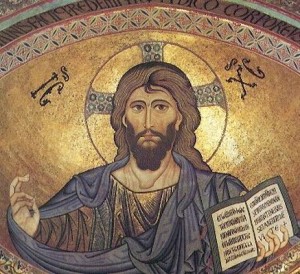 'I have told you, but you do not believe. The works I do in my Father's name are my witness; but you do not believe, because you are no sheep of mine.
'I have told you, but you do not believe. The works I do in my Father's name are my witness; but you do not believe, because you are no sheep of mine.The sheep that belong to me listen to my voice; I know them and they follow me. I give them eternal life; they will never be lost and no one will ever steal them from me.
The Father who gave them to me is greater than anyone,
and no one can steal from the Father.
The Father and I are one.'
The Gospel of the Lord. Praise to you, Lord Jesus Christ.
*******************
Gospel Reflection Tuesday,2 May Fourth Week of Easter John 10:22-30
The first reading describes a significant moment in the life of the early church, the preaching of the gospel to pagans for the first time, in the city of Antioch. Up until that moment, all the disciples of Jesus were Jews. The leaders of the church in Jerusalem had to discern whether this new development in Antioch was the work of the Holy Spirit, or just a human aberration. As part of their discerning, they sent one of their members, Barnabas, to check out what was happening in Antioch. He was sent because he was known to be a good man, filled with the Holy Spirit and faith. A person filled with the Holy Spirit was likely to discern whether or not this novelty was the work of the Spirit. Barnabas immediately recognized that God was at work here. He not only gave them all every encouragement, he set out for Tarsus to bring Paul to Antioch, because he could see that this new development in Antioch was ripe for Paul’s gifts. Paul and Barnabas went on to spend twelve months together in that church.
According to the reading, it was in Antioch that the followers of Jesus were first called ‘Christians’. People began to see that this movement wasn’t just a particular branch of Judaism. The Lord is always doing something new among us, and we all need to discern the ways the Lord is leading the church, especially in these times. To do that well, we need a listening ear, an ear that is open to the surprising ways of the Spirit. As Jesus says in the gospel reading, those ‘who belong to me listen to my voice’. People like Barnabas who are in tune with the working of the Spirit among us are an invaluable asset as we try to discern where the Lord is leading us. The Lord will always provide such people at times of transition, like the present time. Indeed, he invites each of us to become such a person.
__________________________________
The Scripture Readings are taken from The Jerusalem Bible, published 1966 by Darton, Longman & Todd Ltd. and used with the permission of the publishers. http://dltbooks.com/
The Scripture Reflection is made available with our thanks from his book Reflections on the Weekday Readings 2021/ 2024: The Word is near to you, on your lips and in your heart by Martin Hogan and published by Messenger Publications 2022/23, c/f www.messenger.ie/bookshop/
Sliocht as Gníomhartha na nAspal 11:19-26
Thosaigh siad ag caint leis na Gréagaigh chomh maith agus ag fógairt dea-scéal an Tiarna Íosa dóibh.
An mhuintir úd a scaipeadh ag an ngéarleanúint a tharla mar gheall ar Stiofán, ghluais siad rompu chomh fada le Féinice agus leis an gCipir agus le hAintíoch. Níor fhógair siad an briathar, áfach, ach do na Giúdaigh amháin. Ach bhí daoine áirithe orthu – Ciprigh agus Cuiréanaigh ba ea iad – agus nuair a bhain siad Aintíoch amach thosaigh siad ag caint leis na Gréagaigh chomh maith agus ag fógairt dea-scéal an Tiarna Íosa dóibh. Bhí lámh Dé leo san obair agus is iomaí duine a ghlac an creideamh agus a d’iompaigh chun an Tiarna.

Tháinig scéala fúthu go dtí an Eaglais in Iarúsailéim agus sheol siad Barnabas go hAintíoch. Nuair a shroich sé an áit agus nuair a chonaic sé grásta Dé ann, bhí áthas air, agus chomhairligh sé dóibh go léir cloí leis an Tiarna go daingean diongbháilte. Fear maith a bhí ann agus é lán den Spiorad Naomh agus de chreideamh. Agus cuireadh slua maith mór le buíon an Tiarna.
D’imigh Barnabas go Tarsas ag lorg Shóil, agus tar éis dó é a fháil, thug sé leis go hAintíoch é. Thug siad bliain iomlán ar aíocht ag an Eaglais ann agus thug siad teagasc dá lán daoine. Agus tharla gur in Aintíoch is túisce a tugadh Críostaithe ar na deisceabail.
Briathar an Tiarna Buíochas le Dia
Salm le Freagra Sm 86
Freagra Molaigí an Tiarna, a chiníocha uile
Malairt freagra Alleluia!
1. Is ionúin leis an Tiarna a chathair suite sna sléibhte.
Is ansa leis an Tiarna doirse Shíón na bothanna uile Iacóib.
Maítear nithe glórmhara i do thaobh, a chathair Dé! Freagra
2. “Áireoidh mé Ráhab agus an Bhablóin ar lucht mo adhartha.
Beidh Filistía agus an Tuír agus an Aetóip á n-áireamh ina gclann aici.
Agus beifear á rá faoi Shíón: Sí is máthair dó seo is dó siúd.’” Freagra
3. Is é an Tiarna, an Té is Airde, a bhunaigh go daingean í.
Scríobhfaidh an Tiarna i leabhar na bpobal: “Rugadh iad uile san áit sin.”
Ag rince dóibh beidh siad ag canadh: “Níl foinse agam nach bhfuil ionatsa.” Freagra
SOISCÉAL
Go raibh an Tiarna libh. Agus le do spiorad féin
Sliocht as an Soiscéal naofa de réir Naomh Eoin 10:22-30 Glóir duit, a Thiarna.
Is aon mise agus an tAthair.
Bhí féile na Toirbhearta in Iarúsailéim agus ba é an geimhreadh é. Agus bhí Íosa ag siúl timpeall sa Teampall i bpóirse Sholaimh. Chruinnigh na Giúdaigh ina thimpeall agus dúirt siad leis:
“An fada a bheimid dár gcoinneáil ar bís agat? Más tú an Críost inis dúinn é os comhair an tsaoil.”
D’fhreagair Íosa iad:
“D’inis mé daoibh, ach ní chreideann sibh.

Na hoibreacha a dhéanaim in ainm m’Athar, tugann siad fianaise i mo thaobh.
Ach ní chreideann sibhse, mar ní de mo chaoirigh sibh.
Éisteann mo chaoirigh le mo ghlór, agus aithním iad, agus leanann siad mé.
Tá an bheatha shíoraí agam á tabhairt dóibh, agus ní chaillfear go deo iad,
ná ní fhuadóidh aon duine as mo láimh iad.
M’Athair a thug dom iad, is mó é ná cách, agus ní féidir d’aon duine fuadach ó láimh m’Athar.
Is aon mise agus an tAthair.”
Soiscéal an Tiarna. Moladh duit, a Chriost
AN BÍOBLA NAOFA
© An Sagart
The Fifth Sunday of Easter
The Church grows in the fear of the Lord, filled with the consolation of the Holy Spirit.
The Father watches over the growth of the vine that it may bear more fruit.
Faith, love and obedience to the commandments give life.
FIRST READING
A reading from the Book Acts of the Apostles 9:26-31
Barnabas explained how the Lord had appeared to Saul and spoken to him on his journey.
 When Saul got to Jerusalem he tried to join the disciples, but they were all afraid of him: they could not believe he was really a disciple. Barnabas, however, took charge of him, introduced him to the apostles, and explained how the Lord had appeared to Saul and spoken to him on his journey, and how he had preached boldly at Damascus in the name of Jesus.
When Saul got to Jerusalem he tried to join the disciples, but they were all afraid of him: they could not believe he was really a disciple. Barnabas, however, took charge of him, introduced him to the apostles, and explained how the Lord had appeared to Saul and spoken to him on his journey, and how he had preached boldly at Damascus in the name of Jesus.Saul now started to go round with them in Jerusalem, preaching fearlessly in the name of the Lord. But after he had spoken to the Hellenists, and argued with them, they became determined to kill him. When the brothers knew, they took him to Caesarea, and sent him off from there to Tarsus.
The churches throughout Judaea, Galilee and Samaria were now left in peace, building themselves up, living in the fear of the Lord, and filled with the consolation of the Holy Spirit.
The Word of the Lord Thanks be to God
Responsorial Psalm Ps 21
Response You, Lord, are my praise in the great assembly.
Or Alleluia!
1. My vows I will pay before those who fear him. The poor shall eat and shall have their fill.
They shall praise the Lord, those who seek him. May their hearts live for ever and ever! Response
2. All the earth shall remember and return to the Lord, all families of the nations worship before him.
They shall worship him, all the mighty of the earth; before him shall bow all who go down to the dust. Response
3. And my soul shall live for him, my children serve him. They shall tell of the Lord to generations yet to come,
declare his faithfulness to peoples yet unborn: 'These things the Lord has done.' Response
SECOND READING
A reading from the first letter of St John 3:18-24
His commandments are these:
that we believe in the name of his Son Jesus Christ and that we love one another.
My children,
our love is not to be just words or mere talk, but something real and active;
only by this can we be certain that we are the children of the truth
and be able to quieten our conscience in his presence,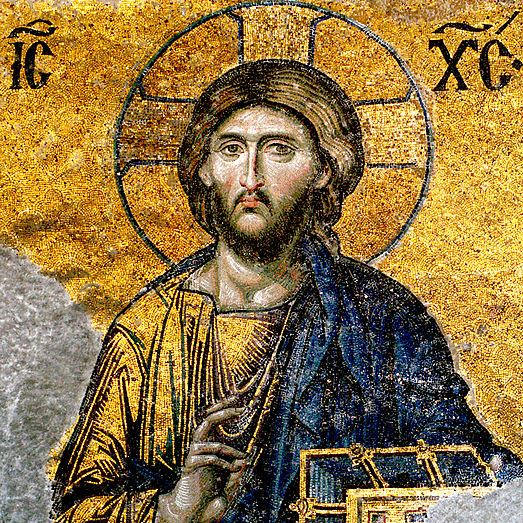
whatever accusations it may raise against us, because God is greater than our conscience and he knows everything.
My dear people, if we cannot be condemned by our own conscience,
we need not be afraid in God's presence, and whatever we ask him, we shall receive, because we keep his commandments and live the kind of life that he wants.
His commandments are these:
that we believe in the name of his Son Jesus Christ
and that we love one another as he told us to.
Whoever keeps his commandments lives in God and God lives in him.
We know that he lives in us by the Spirit that he has given us.
The Word of the Lord Thanks be to God
Gospel Acclamation Jn 14: 10
Alleluia, alleluia!
Make your home in me, as I make mine in you. Whoever remains in me bears fruit in plenty.
Alleluia!
GOSPEL
The Lord be with you And with your spirit
A reading from the holy Gospel according to John 15:10 Glory to you, O Lord
Whoever remains in me, with me in him, bears fruit in plenty.
Jesus said to his disciples:
'I am the true vine, and my Father is the vinedresser.
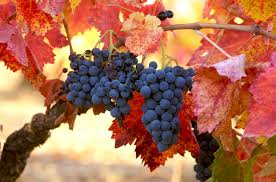
Every branch in me that bears no fruit he cuts away,
and every branch that does bear fruit he prunes to make it bear even more.
You are pruned already, by means of the word that I have spoken to you.
Make your home in me, as I make mine in you.
As a branch cannot bear fruit all by itself, but must remain part of the vine, neither can you unless you remain in me.
 I am the vine, you are the branches.
I am the vine, you are the branches.Whoever remains in me, with me in him, bears fruit in plenty;
for cut off from me you can do nothing.
Anyone who does not remain in me is like a branch that has been thrown away - he withers; these branches are collected and thrown on the fire, and they are burnt.
If you remain in me and my words remain in you, you may ask what you will and you shall get it. It is to the glory of my Father that you should bear much fruit, and then you will be my disciples.'
The Gospel of the Lord. Praise to you, Lord Jesus Christ
For homily resources for this Sunday's Gospel click here: https://www.catholicireland.net/sunday-homily/
Taken from THE JERUSALEM BIBLE, published and copyright 1966 by Darton, Longman and Todd Ltd and Doubleday, a division of Random House Inc, and used by permission of the publishers.
Sliocht as Leabhar Gníomhartha na nAspal 6:26-31
D'inis Barnabas do na haspail mar a chonaic Sól an Tiarna ar an tslí.
 Ar theacht dó go Iarúsailéim rinne sé iarracht ar dhul i bpáirt leis na deisceabail ach bhí eagla orthu go léir roimhe mar ní chreidfidís gur dheisceabal é. Ansin thóg Barnabas faoina chúram é agus thug i láthair na n-aspal é, ag aithris dóibh conas mar a chonaic sé an Tiarna ar an mbóthar agus mar a rinne sé comhrá leis agus mar a labhair sé go teann in ainm Íosa i nDamaisc.
Ar theacht dó go Iarúsailéim rinne sé iarracht ar dhul i bpáirt leis na deisceabail ach bhí eagla orthu go léir roimhe mar ní chreidfidís gur dheisceabal é. Ansin thóg Barnabas faoina chúram é agus thug i láthair na n-aspal é, ag aithris dóibh conas mar a chonaic sé an Tiarna ar an mbóthar agus mar a rinne sé comhrá leis agus mar a labhair sé go teann in ainm Íosa i nDamaisc. D’fhan Sól in éineacht leo in Iarúsailéim gan chosc gan cheangal air ach é ag labhairt go dána in ainm an Tiarna. Bhíodh sé ag caint agus ag conspóid leis na Giúdaigh Heilléanacha freisin. Rinne siadsan iarracht ar é a mharú ach nuair a fuair na bráithre amach é, thóg siad Sól leo go Céasaráia agus chuir as sin go Tarsas é. Mar sin bhí síocháin ag an Eaglais ar fud Iúdáia go léir agus na Gailíle agus na Samáire. Lean sí á tógáil féin agus ag dul chun cinn faoi eagla an Tiarna agus ag dul i méid le cabhair an Spioraid Naoimh.
Briathar an Tiarna Buíochas le Dia
Salm le Freagra Sm 21
Freagra Is tú mo mholadh sa mhórthionól, a Thiarna.
Malairt Freagra Alleluia!
I. Comhlíonfaidh mé mo mhóideanna i láthair na droinge ar a mbíonn a eagla.
Íosfaidh na bochtáin agus beidh a sáith acu. Molfaidh lucht a iarrtha an Tiarna.
Go maire a gcroíthe go brách na breithe. Freagra
2. Cuimhneoidh an domhan uile agus casfaidh ar an Tiarna, agus adhrfaidh na ciníocha uile ina fhianaise.
Adhrfaidh maithe móra an talaimh ina fhianaise. Cromfaidh ina láthair a ngabhann síos sa luaithreach. Freagra
3. Mairfidh m'anam ar a shon; déanfaidh mo chlann fónamh dó. Tabharfaidh tuairisc an Tiarna do ghlúin atá le teacht.
Foilseoidh siad a dhílseacht do phobal nár saolaíodh fós: 'Sin iad na nithe a rinne an Tiarna.' Freagra
DARA LÉACHT
Sliocht as an chéad Litir Naomh Eoin 3:18-24
Seo í an aithne a thug sé: go gcreidfimis in ainm a Mhic Íosa Críost agus go dtabharfaimis grá dá chéile.
 A chlann liom, ná tugaimis grá briathair ná cainte amháin, ach grá gnímh agus fírinne. Is mar sin a aithneoimid gur de chlann na fírinne sinn, agus is mar sin a shuaimhneoimid ár gcoinsias ina láthairsean, má chiontaíonn ár gcroí sinn. Óir gur treise é Dia ná ár gcroí-ne agus is feasach dó an uile ní.
A chlann liom, ná tugaimis grá briathair ná cainte amháin, ach grá gnímh agus fírinne. Is mar sin a aithneoimid gur de chlann na fírinne sinn, agus is mar sin a shuaimhneoimid ár gcoinsias ina láthairsean, má chiontaíonn ár gcroí sinn. Óir gur treise é Dia ná ár gcroí-ne agus is feasach dó an uile ní.A chairde cléibh, mura gciontaíonn ár gcroí sinn táimid lánmhuiníneach as Dia. Agus cibé ní a agraímid air, gheobhaimid uaidh é, ó tharla go gcoinnímid a aitheanta agus go ndéanaimid beart de réir a thaitnimh. Agus seo í an aithne a thug sé: go gcreidfimis in ainm a Mhic Íosa Críost agus go dtabharfaimis grá dá chéile, de réir mar a d’ordaigh seisean dúinn. An té a choinníonn a aitheanta, maireann i nDia, agus maireann seisean ann. Agus is mar seo a aithnímid go maireann sé ionainn, tríd an Spiorad a thug sé dúinn.
Briathar an Tiarna Buíochas le Dia
Alleluia Véarsa Eo 15: 4-5
Alleluia, Alleluia!
'Fanaigí ionamsa, agus mise ionaibh,' a deir an Tiarna.
'An té a fhanann ionamsa, tugann sé toradh mór uaidh.'
Alleluia!
SOISCÉAL
Go raibh an Tiarna libh. Agus le do spiorad féin
Sliocht as an Soiscéal naofa de réir Naomh Eoin 15:1-8 Glóir duit, a Thiarna.
An té a fhanann ionamsa, agu mise ann, tugann sé toradh mór uaidh
San am sin dúirt Íosa lena dheisceabail:
Mise an fhíniúin fhíor, agus is é m’Athair an saothraí.
Gach géag ionam nach dtugann toradh, bainfidh sé í;
agus gach géag a thugann toradh, ionas go dtabharfaidh sí breis toraidh.
Tá sibhse bearrtha de bharr an bhriathair a labhair mé libh.
Fanaigí ionamsa, agus mise ionaibh. Faoi mar nach féidir don ghéag
toradh a thabhairt uaithi féin, mura bhfanann sí san fhíniúin,sin mar nach féidir daoibhse, mura bhfanann sibh ionamsa.

Mise an fhíniúin, sibhse na géaga; an té a fhanann ionamsa, agus mise ann,
tugann seisean toradh mór uaidh; óir gan mise, ní féidir daoibh aon ní a dhéanamh.
Cibé nach bhfanfaidh ionamsa, caithfear amach é mar ghéag, agus feofaidh sé;
agus tógfar agus caithfear sa tine iad, agus dófar iad.
Má fhanann sibh ionamsa agus má fhanann mo bhriathra ionaibh,
iarrfaidh sibh cibé ní is mian libh agus déanfar daoibh é.
Tugadh glóir do m’Athair sa mhéid go dtugann sibhse toradh mór uaibh,
agus go mbeidh sibh in bhur ndeisceabail agamsa.
Soiscéal an Tiarna. Moladh duit, a Chriost
************************************
Machtnamh ar Bhriathar Dé dia 5ú Domhnach na Cásca
Cén fáth go bhfuil gá le bearradh
Tá fhios ag na daoine a chothaionn rósanna go gcaithfear na plandaí a bearradh gach blian más mian leo fás maith a bheith iontu. Is fíor sin don chuid is mó de plandaí mar an chéanna; cabhraíonn an bhearradh leis an shaol nua. Tagraíonn Íosa le bearradh sa soiscéal inniú. Tugann sé le fios go ndéanann Dia bearradh ar ár saol ó am go h’am, chun iad a dhéanamh níos fiúnta ná mar atá siad faoi láthair. Tá roinnt rudaí ann a gur chóir a dhíbirt, má’s mian linn bheith cóir i láthair Dé. Thárlódh sé go mba thairfí an rud é scaoileadh le rudaí áirithe , cé gur leasg linn ag an am, a cabhródh linn cur len ár gcaidreamh le Dia agus le daoine eile. Nuair a déantar an bearradh seo is giorra dúinn bíonn an Tiarna, i bhfocail an tsoiscéil, déanann sé cónái linn. Ní gá dúinn a bheith ag brath ar ár neart féin. Nuair a bhíonn an Tiarna ag cur faoi ionainn bíonn Sé taobh linn, rud a thugann saol nua níos torthúla dúinn. Ach chun go dtarlódh seo ní mór dúinn fanacht in a láthair mar a fhanann sé linne.
Pádraig Ó Rúairí, cp,
Sliabh Argus, Átha Cliath.
********************************************
AN BÍOBLA NAOFA
© An Sagart


